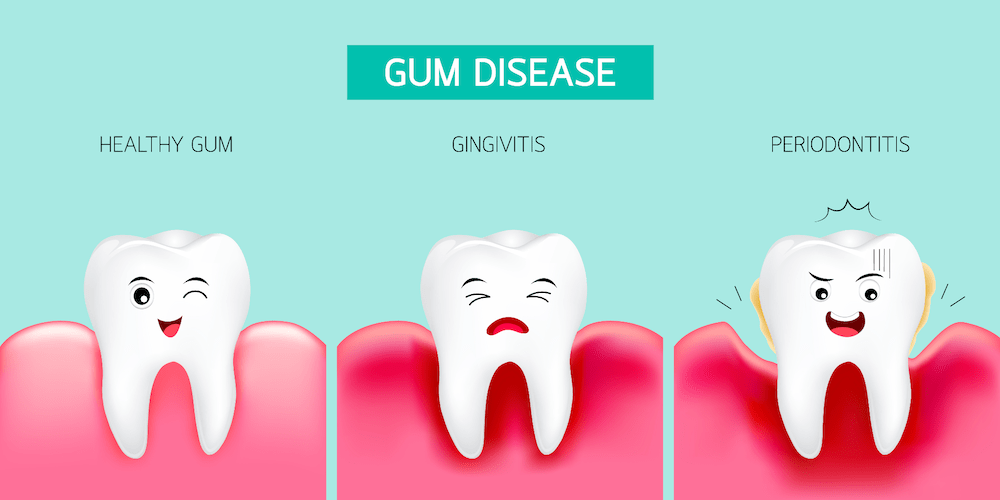
Why are you told to visit the dentist every six months? The truth behind this specific recommendation actually came from Colgate Toothpaste. It was part of a marketing campaign that promoted the idea that in conjunction with brushing and flossing, you should visit the dentist every six months. Turns out Colgate wasn’t completely out to lunch, as seeing a dentist twice a year, or every six months, works well for MOST people. If you have little risk of cavities or gum disease, then seeing your dentist once or twice a year should be fine. HOWEVER, if you have a higher risk of gum disease or cavities, you might need to visit every three or four months.
Everyone is different, so to determine your personalized interval recommendation, there are a few key points we look at.
1. Bone/gum disease (aka periodontal disease).
The health of your gums and bones (also referred to as your “periodontal condition”) plays a huge factor in determining how often you should be visiting your dentist. We want to prevent recession and bone loss, two important factors that hold your teeth in place and maintain ideal function. We use different instruments to remove any plaque, build up or lurking bacteria that could be contributing to the destruction.
Other important factors to consider:
- If you previously had periodontal disease
- The rate at which your mouth produces plaque/tartar
- Your hygiene home care routine
- Your body’s response to treatment
- If you have any “pocketing”. This term is used to describe bone loss between your teeth and gums.
Bone loss occurs for a variety of reasons, but once there, it’s very important to keep your teeth clean.
Something very important to note: Treatment of gingivitis or periodontal disease in early stages can prevent pain/tenderness or possible tooth loss down the road.
2.Tooth decay.
Visiting us twice a year can help prevent decay from damaging your teeth. X-rays allow your dentist to see the full picture of your teeth’s health and they can diagnose cavities. If we catch cavities when they’re small it prevents larger, more invasive treatment.
3. Plaque or tartar buildup missed while brushing at home.
If build-up is left too long in those hard to reach areas, it can cause cavities. If left untreated, it can cause pain and irritate the gums, potentially leading to gum disease.
4.Oral cancer detection.
Oral cancer is a serious disease that manifests in various ways. We will check your mouth, gums and tongue for signs of oral cancer. If any swelling, lumps, or other abnormalities are found, we will inquire or alert you. If needed, we will refer you to an appropriate medical professional. Your Dentist and Hygienist are trained to look for early stages of disease and work with other professionals to ensure you’re getting the best care.
At ThirtyTwo Dental, we are committed to helping you on your journey in achieving dental and overall health. Each patient we see is unique. We are aware that most are not well-served by the default prescriptions of once a year hygiene visits dictated by most insurance plans. We believe in patient-specific maintenance care programs and will customize a plan for you.
“An ounce of prevention is worth a pound of cure.” —Benjamin Franklin